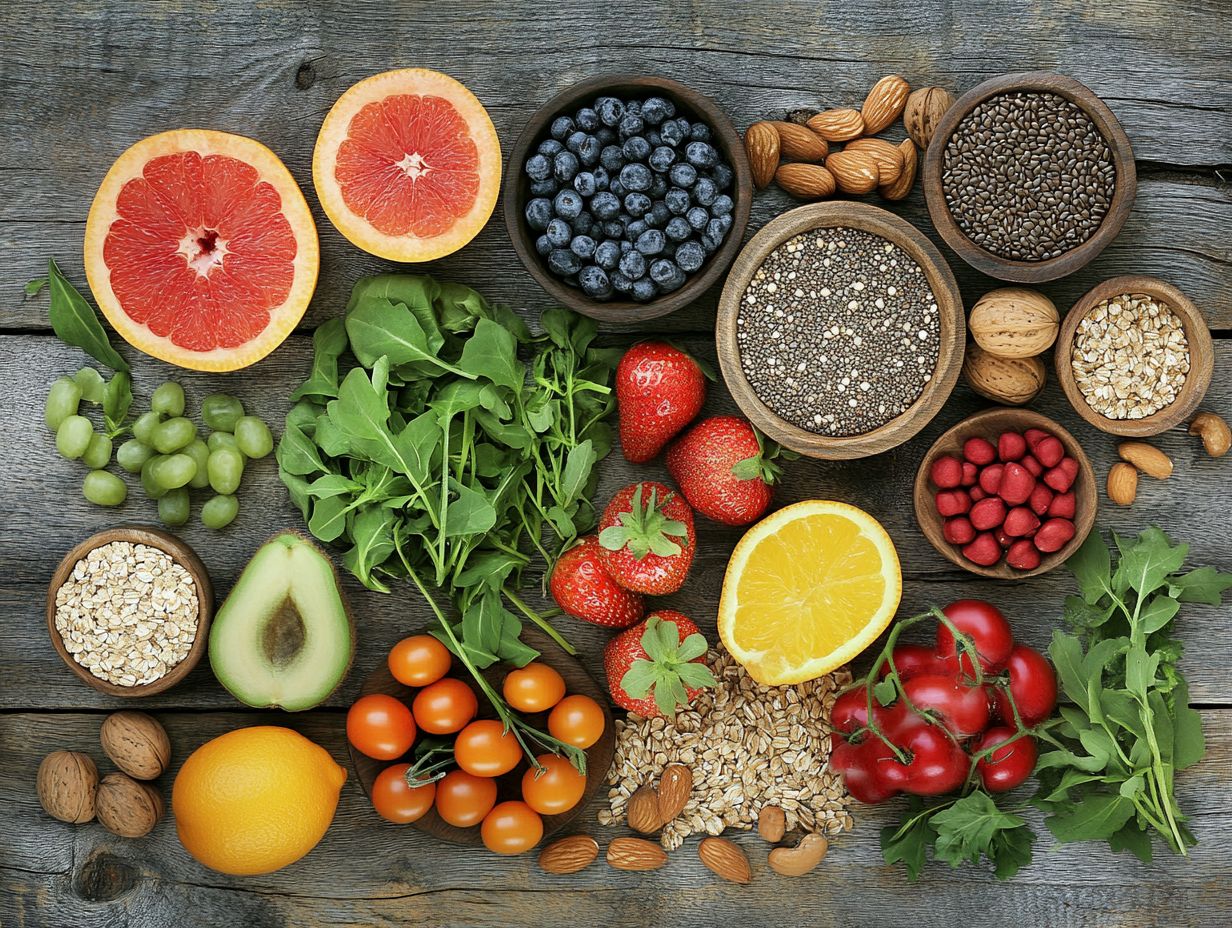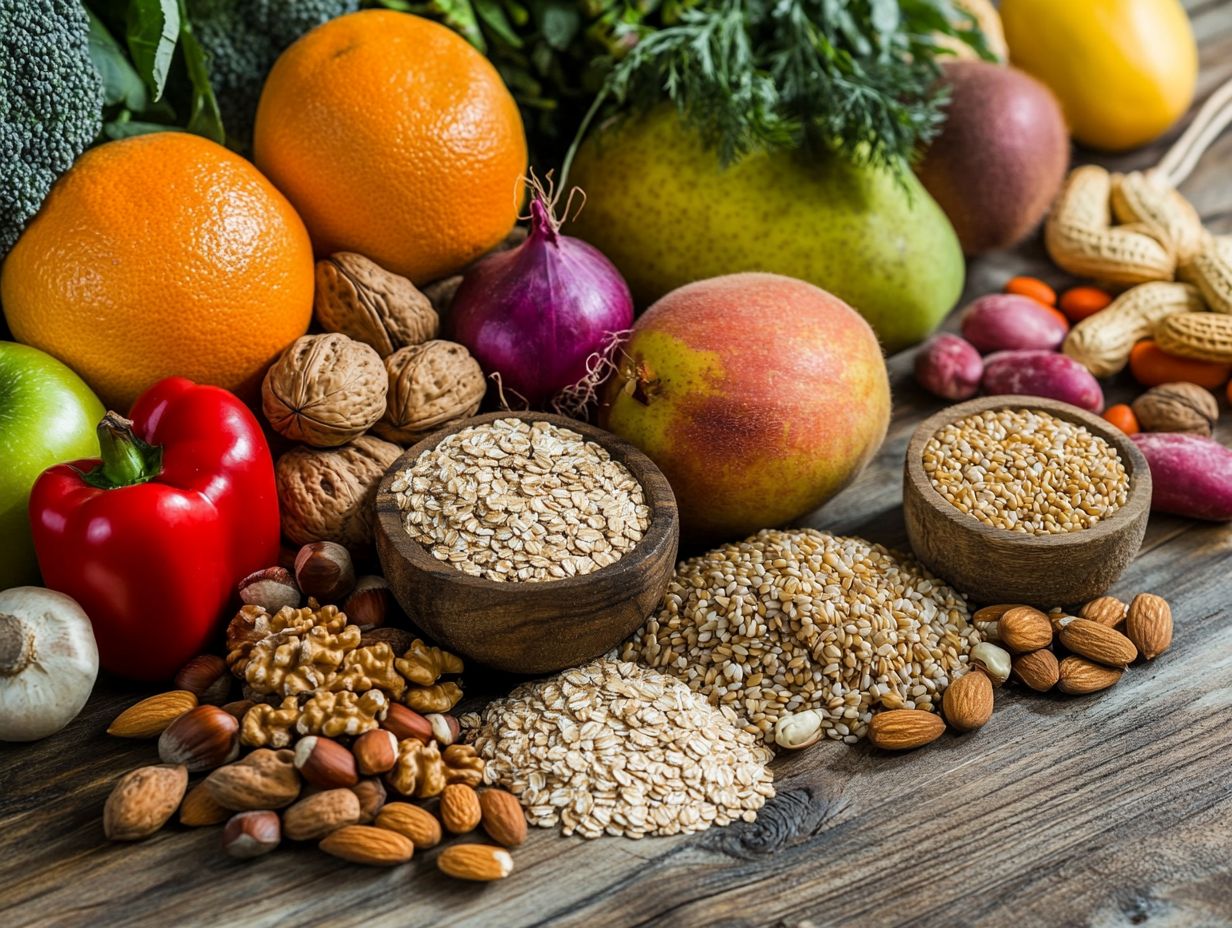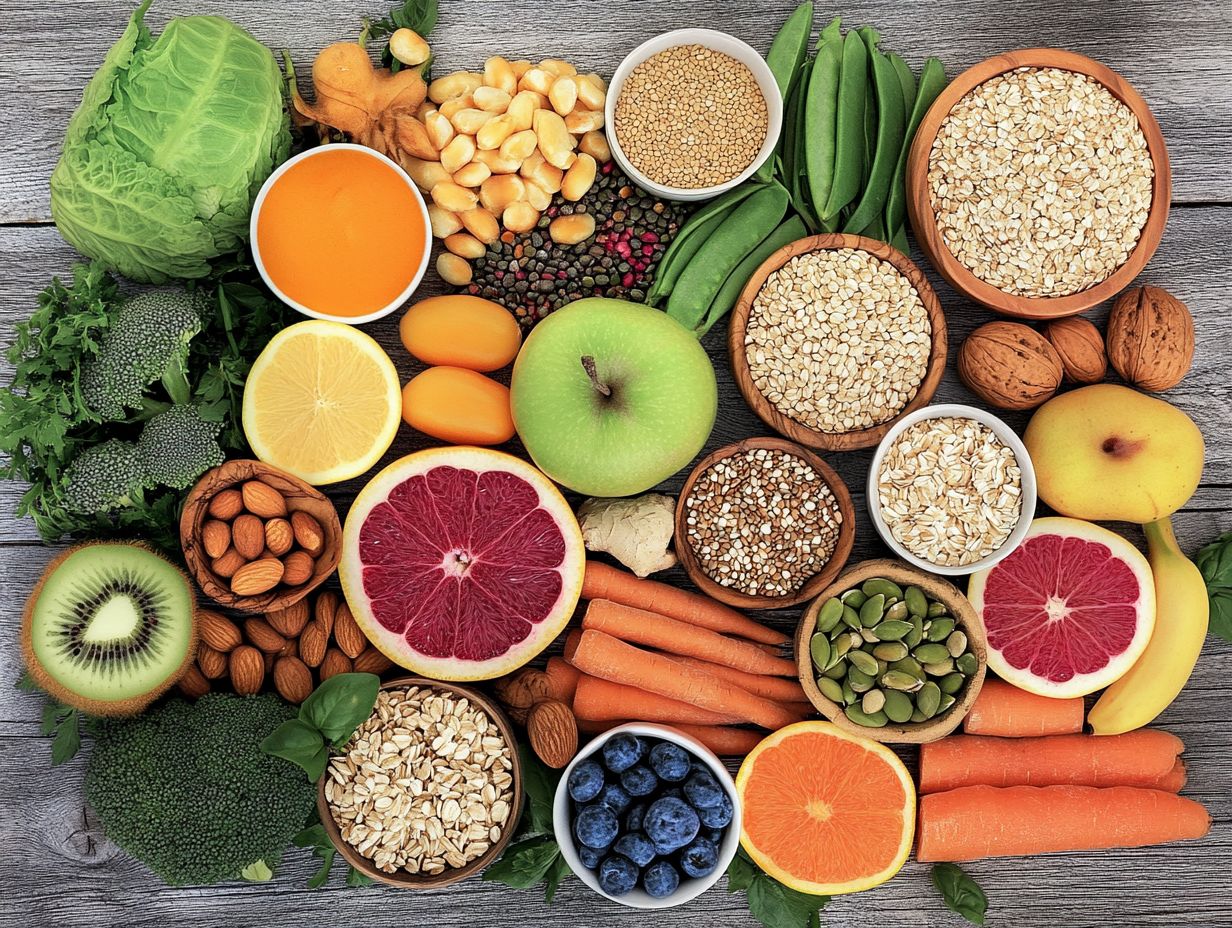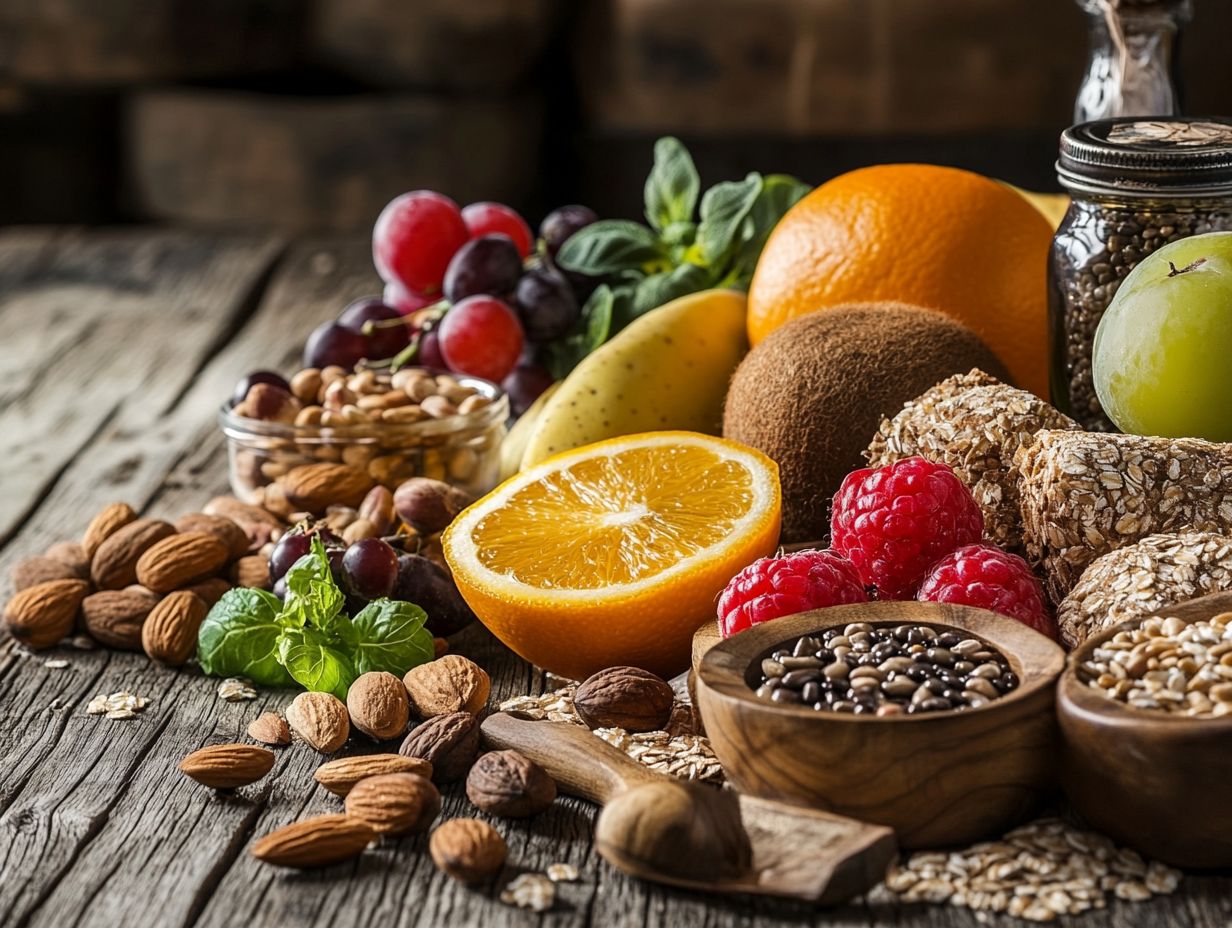What Role Do Whole Foods Play in Holistic Nutrition?
In a world increasingly filled with processed options, embracing holistic nutrition can elevate your health by prioritizing whole foods. Get ready to discover the exciting world of holistic nutrition!
This article delves into the true essence of holistic nutrition, illuminating the myriad benefits of a whole foods diet. You’ll discover how whole foods compare to processed alternatives, explore essential factors to consider when integrating more nutrient-rich foods into your meals, and gain practical tips for enhancing nutrient absorption.
Join in as we unveil the transformative power of mindful eating, revealing how straightforward dietary shifts can lead you to a healthier, more vibrant life.
Contents
- Key Takeaways:
- Holistic Nutrition: An Overview
- Benefits of a Whole Foods Diet
- Whole Foods vs Processed Foods
- Incorporating Whole Foods into Your Diet
- Maximizing Nutrient Absorption
- Frequently Asked Questions
- What role do whole foods play in holistic nutrition?
- Why are whole foods considered important in holistic nutrition?
- How do whole foods contribute to a balanced diet in holistic nutrition?
- Can I still eat processed foods in a holistic nutrition diet?
- What are some examples of whole foods that are beneficial for holistic nutrition?
- How does incorporating whole foods into my diet benefit my overall health?
Key Takeaways:

- Whole foods are essential for a holistic approach to nutrition, providing numerous health benefits while minimizing the risks associated with processed foods.
- Transitioning to a whole foods diet can be challenging, but tips like meal planning and exploring new recipes can make the process easier and more enjoyable.
- To get the most nutrients from whole foods, think about how you cook them and what you pair them with. Mindful eating and proper digestion can also improve absorption.
Holistic Nutrition: An Overview
Holistic nutrition offers you a comprehensive approach to food and health that highlights the intricate connections between your body, mind, and spirit. It encourages you to make informed dietary choices that truly support your overall well-being. This approach considers various factors, including your d dietary history, emotional health, and lifestyle habits, with the ultimate goal of fostering a balanced state of health.
By emphasizing whole foods and nutrient density which refers to the amount of essential nutrients per calorie of food along with the benefits of essential vitamins like A, C, E, and D, holistic nutrition guides you toward healthier eating habits. This not only enhances your immune system and improves gut health but also helps reduce the risk of chronic diseases.
Defining Holistic Nutrition
Defining holistic nutrition means embracing a comprehensive approach that seamlessly integrates nutritional practices with emotional well-being and healthy eating habits. This methodology encourages you to consume whole foods that nourish your body while also considering the mental and emotional impacts of your dietary choices.
By focusing on nutrient-rich foods, you can harness the benefits of vitamins and minerals that are critical for your overall health.
As you cultivate awareness of how your food choices influence your mood and energy levels, this holistic perspective enables you to make informed decisions that enhance both your physical and emotional health. Incorporating lifestyle factors like regular physical activity, effective stress management techniques, and sufficient sleep can significantly elevate your well-being.
When you embrace these interconnected aspects, you’re not just likely to experience improved vitality; you also build resilience against chronic diseases, paving the way for a healthier future. Ultimately, this balanced approach nurtures both your body and mind, creating a solid foundation for lifelong wellness.
Benefits of a Whole Foods Diet
A whole foods diet offers a wealth of nutrients and is free from processed foods, delivering a multitude of health benefits that significantly enhance your overall well-being.
This dietary approach encourages you to indulge in organic foods, fruits, and vegetables, all rich in antioxidants and essential vitamins A, C, E, and D. These nutrients contribute to a more robust immune response and elevated energy levels.
Whole foods also improve nutrient absorption and support emotional well-being by stabilizing your energy levels and enhancing your mood through balanced nutrition.
Start your journey to vibrant health today make the switch to whole foods!
Nutrient Density and Health Benefits

Nutrient density means how much good stuff is in a food compared to how many calories it has. Whole foods are great examples of this concept. By choosing foods high in vitamins, minerals, and antioxidants, you can enjoy many health benefits, such as increased energy and a stronger immune system. Eating nutrient-dense foods not only supports your physical health but also boosts your emotional well-being.
Consider foods like leafy greens, berries, nuts, seeds, and fatty fish as excellent choices. For instance, kale is packed with vitamins A, C, and K, offering powerful antioxidants that help combat oxidative stress.
On the other hand, salmon is rich in omega-3 fatty acids, which are essential for heart and brain health.
Incorporating these nutrient-dense foods into your daily meals can lead to sustained energy throughout the day, providing essential nutrients without unnecessary calories. By focusing on high-quality foods, you ll enjoy long-term health benefits and decrease your risk of chronic diseases while improving mental clarity. This can give you the energy to thrive every day.
Whole Foods vs Processed Foods
Understanding the differences between whole foods and processed foods is key to making informed dietary choices that greatly affect your health and wellness. Whole foods are minimally processed and retain their natural nutrients, providing your body with the nutrients it craves.
Processed foods, however, often contain added sugars, unhealthy fats, and preservatives, leading to potential health risks. Recognizing this distinction is vital; processed foods can harm gut health, hinder nutrient absorption, and weaken your immune system, paving the way for chronic diseases and poor metabolic function.
Nutrient Content and Potential Health Risks
The nutrient content of foods significantly influences their effects on your health, especially when comparing processed foods to whole foods. Processed options often lack essential nutrients and may include harmful additives that contribute to chronic diseases such as obesity, diabetes, and heart disease. Understanding these health risks highlights the importance of making dietary choices that favor whole foods.
These additives like preservatives, artificial flavors, and high-fructose corn syrup can cause inflammation and disrupt your metabolism. Regularly consuming these products can undermine your immediate well-being and set the stage for long-term health challenges.
In contrast, choosing nutrient-rich whole foods provides your body with vital vitamins and minerals, boosting your energy levels while reducing the risk of chronic conditions. Choose natural ingredients to supercharge your health!
Incorporating Whole Foods into Your Diet
Incorporating whole foods into your diet is a crucial step toward embracing a healthier lifestyle, achievable through thoughtful meal planning and preparation.
By prioritizing natural choices such as organic fruits, fresh vegetables, and whole grains you can smoothly transition from processed foods to more nutrient-dense options.
Embracing home cooking, sourcing ingredients from local farmers, and preparing healthy snacks are effective strategies that not only boost your nutrient intake but also enhance hydration and support overall dietary improvements.
Start today your body will thank you!
Tips for Transitioning to a Whole Foods Diet

Transitioning to a whole foods diet is an exciting journey that can truly transform your health! It can be both rewarding and challenging, demanding thoughtful meal planning and preparation. By gradually swapping out processed foods for fresh, organic options, you can craft meals that are not just healthier but also more satisfying.
Cooking at home and preparing nutritious snacks can significantly ease this transition, helping you embrace a lifestyle centered around whole foods. To embark on this journey, consider starting with just one meal a day focused entirely on whole foods. This approach minimizes overwhelm and allows your body time to adapt.
Exploring new recipes can reignite your passion in the kitchen, encouraging you to use vibrant, seasonal ingredients that elevate both flavor and nutrition. Incorporating healthy snacks like raw nuts, fruits, or vegetable sticks will play a vital role in maintaining your energy levels and curbing cravings throughout the day. These smart strategies will make your transition a breeze and enjoyable!
Maximizing Nutrient Absorption
Maximizing nutrient absorption is crucial for you to fully enjoy the benefits of a healthy diet and ensure your body efficiently utilizes the nutrients you consume. Several factors can influence this absorption, including the types of foods you eat, the cooking methods you employ, and the overall balance of protein in your diet and hydration in your meals.
By incorporating probiotics and whole foods into your diet, you can significantly enhance nutrient absorption, supporting your gut health and promoting a balanced diet tailored to your individual nutritional needs.
Factors that Affect Nutrient Absorption
Several factors can significantly impact your nutrient absorption, affecting how effectively your body utilizes the nutrients from food. These factors include the quality of dietary protein you consume, your hydration levels, and the processing methods of the foods you choose all of which can enhance or hinder how well your body can absorb nutrients. Understanding these elements is crucial for optimizing your nutritional intake and supporting gut health.
For instance, when you opt for high-quality protein sources like lean meats, fish, and legumes, you not only provide your body with essential amino acids but also support tissue rebuilding and the absorption of vital vitamins and minerals. Hydration plays an equally critical role; water aids in digestion and transports nutrients throughout your body, underscoring the importance of drinking enough fluids, especially during meals.
Whole foods, such as fruits, vegetables, and whole grains, are brimming with fiber and beneficial compounds that enhance digestion and maximize nutrient absorption. In contrast, heavily processed foods often lose many of their essential nutrients. This emphasizes why you should be mindful of your food choices after all, even the same nutrient can be absorbed differently depending on the source.
Simple Strategies to Boost Nutrient Absorption
Implementing effective strategies for improving nutrient absorption can significantly elevate your overall health and well-being. By focusing on whole foods, incorporating probiotics into your meals, and utilizing cooking methods that maintain nutrient integrity, you can optimize your dietary intake for superior health outcomes. A balanced diet that highlights diverse food sources will also encourage higher rates of nutrient absorption.
Pairing certain foods can further enhance nutrient uptake; for instance, enjoying leafy greens alongside healthy fats can improve the absorption of fat-soluble vitamins. Cooking methods like steaming or saut ing help retain essential nutrients while making them more bioavailable.
Incorporating probiotic-rich foods, such as yogurt and fermented vegetables, can support gut health, playing a crucial role in the absorption process. By consistently integrating these strategies into your daily eating habits, you not only pave the way for improved nutrition but also contribute to long-term health benefits, including enhanced immunity and better digestion.
Frequently Asked Questions

What role do whole foods play in holistic nutrition?
Whole foods are essential in holistic nutrition. They provide nutrients in their most natural form, free from preservatives and processing. However, understanding the role of supplements can also enhance your nutrition journey.
Why are whole foods considered important in holistic nutrition?
Whole foods are important because they contain a variety of nutrients, such as vitamins, minerals, and antioxidants. These elements nourish and support overall health and well-being.
How do whole foods contribute to a balanced diet in holistic nutrition?
Whole foods serve as the foundation of a balanced diet. They offer proteins, healthy fats, complex carbohydrates, and fiber, all vital for maintaining good health.
Can I still eat processed foods in a holistic nutrition diet?
The focus in holistic nutrition is on whole, natural foods. Processed foods can be included in small amounts but should not dominate your diet.
What are some examples of whole foods that are beneficial for holistic nutrition?
Examples of beneficial whole foods include fruits, vegetables, whole grains, legumes, nuts, seeds, and lean proteins like fish and poultry.
How does incorporating whole foods into my diet benefit my overall health?
Adding whole foods to your meals can supercharge your health! You’ll enjoy better digestion, more energy, a stronger immune system, and a lower risk of chronic diseases.






